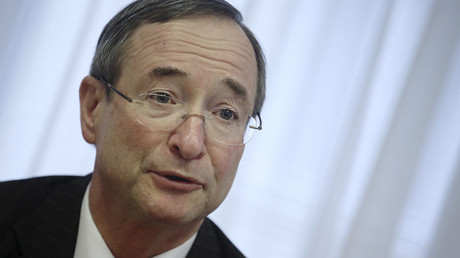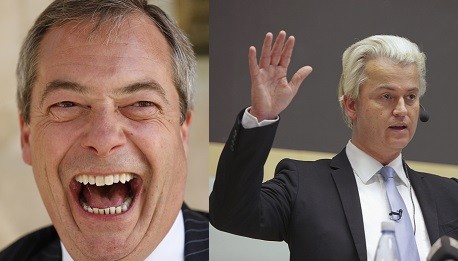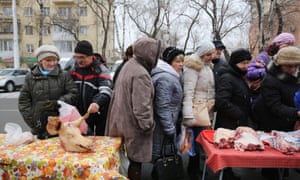In my last blogs entry (Saturday, 7 May 2016) I wrote that,
"Putin, thanks to his invasion and annexation of Ukrainian Crimea, and his war with Ukraine in the Donbas, has woken the sleeping giant of NATO, against which he is now railing."
 This has now reached a crescendo, as Ryan Brown (left) of CNN reports.
This has now reached a crescendo, as Ryan Brown (left) of CNN reports.
"The U.S. launched a new ground-based missile defense system in Romania Thursday, sparking fresh tensions with Russia, which quickly blasted the system as a threat to its security.
...
"From the very outset we kept saying that in the opinion of our experts the deployment of an anti-missile defense poses a threat to Russia," Russian presidential spokesman Dmitry Peskov said, according to the Tass News Agency. "The question is not whether measures will be taken or not; measures are being taken to maintain Russia's security at the necessary level." (CNN : May 12, 2016) (my emphasis)
They further report that,
"An opinion poll published in the Polish press on Thursday found that most Poles now favour a return to conscription because of fears of Russian aggression.
 Poland ditched conscription in 2008, but Russia’s annexation of
Crimea and the war in eastern Ukraine appear to have persuaded many of
the country’s people that it should now return. The survey showed that
58 per cent of Poles were now in favour of conscription while only 34
per cent were against." (ibid David Blair and Matthew Day) (my emphasis) (right: An RS-24
inter-continental ballistic missile is paraded through Moscow.)
Poland ditched conscription in 2008, but Russia’s annexation of
Crimea and the war in eastern Ukraine appear to have persuaded many of
the country’s people that it should now return. The survey showed that
58 per cent of Poles were now in favour of conscription while only 34
per cent were against." (ibid David Blair and Matthew Day) (my emphasis) (right: An RS-24
inter-continental ballistic missile is paraded through Moscow.)
Tyler Durden also reports that,
"There is, of course, a far simpler response. Recall that in November 2008, then Russian president Dmitry Medvedev made a stark warning to NATO: "Russia will deploy Iskander missile systems in its enclave in Kaliningrad to neutralize, if necessary, the anti-ballistic missile system in Europe." We also reported in 2013 that in a seeming escalation as the ballistic shield appeared on its way to completion, there were unconfirmed reports that Russia had deployed a "double-digit" amount of SS-26 mobile units within Kaliningrad." (Zero Hedge : 05/12/2016)
Adding to Putin's woes,
 "In a little covered news story that could have major ramifications for
the geopolitical landscape, the new Supreme Allied Commander of the
North Atlantic Treaty Organization, U.S. Army Gen. Curtis Scaparrotti, (left)
says the alliance should possibly arm Ukraine in its struggle against
pro-Russian separatists in East Ukraine. This is a game changer for the
Kremlin and for U.S.-Russian relations." (L. Todd Wood : The War Monitor (..with permission from The Washington Times) : May 4, 2016) (my emphasis)
"In a little covered news story that could have major ramifications for
the geopolitical landscape, the new Supreme Allied Commander of the
North Atlantic Treaty Organization, U.S. Army Gen. Curtis Scaparrotti, (left)
says the alliance should possibly arm Ukraine in its struggle against
pro-Russian separatists in East Ukraine. This is a game changer for the
Kremlin and for U.S.-Russian relations." (L. Todd Wood : The War Monitor (..with permission from The Washington Times) : May 4, 2016) (my emphasis)
These developments are forcing Putin and his Kremlin kleptocrats to redouble their efforts to further meddle in the politics of the EU, to ensure that those EU politicians 'sympathetic' towards him in Britain and Germany in particular are given centre-stage in his propaganda onslaught towards EU voters.
In 2014 Roland Oliphant reported that,
"Russia could seek to destabilise vast areas of eastern Europe if it is not challenged in Ukraine, Angela Merkel has warned.
How will Putin and his corrupt Kremlin kleptocrats react if Russia is denied an international stage at the upcoming Olympics in Rio De Janeiro?
(to be continued)
"Putin, thanks to his invasion and annexation of Ukrainian Crimea, and his war with Ukraine in the Donbas, has woken the sleeping giant of NATO, against which he is now railing."
"The U.S. launched a new ground-based missile defense system in Romania Thursday, sparking fresh tensions with Russia, which quickly blasted the system as a threat to its security.
...
"From the very outset we kept saying that in the opinion of our experts the deployment of an anti-missile defense poses a threat to Russia," Russian presidential spokesman Dmitry Peskov said, according to the Tass News Agency. "The question is not whether measures will be taken or not; measures are being taken to maintain Russia's security at the necessary level." (CNN : May 12, 2016) (my emphasis)
Similarly, David Blair and Matthew Day report that,
"Tensions between Russia and the West rose still further on Thursday
when Nato declared that a missile defence site in Romania had become
operational.
A battery of American SM-3 interceptors, designed to shoot down
incoming missiles, was activated at Deveselu military base. A similar
facility is due to become operational in Poland in 2018." (The Telegraph : 12 May 2016) (my emphasis)They further report that,
"An opinion poll published in the Polish press on Thursday found that most Poles now favour a return to conscription because of fears of Russian aggression.
"There is, of course, a far simpler response. Recall that in November 2008, then Russian president Dmitry Medvedev made a stark warning to NATO: "Russia will deploy Iskander missile systems in its enclave in Kaliningrad to neutralize, if necessary, the anti-ballistic missile system in Europe." We also reported in 2013 that in a seeming escalation as the ballistic shield appeared on its way to completion, there were unconfirmed reports that Russia had deployed a "double-digit" amount of SS-26 mobile units within Kaliningrad." (Zero Hedge : 05/12/2016)
Adding to Putin's woes,
These developments are forcing Putin and his Kremlin kleptocrats to redouble their efforts to further meddle in the politics of the EU, to ensure that those EU politicians 'sympathetic' towards him in Britain and Germany in particular are given centre-stage in his propaganda onslaught towards EU voters.
In 2014 Roland Oliphant reported that,
"Russia could seek to destabilise vast areas of eastern Europe if it is not challenged in Ukraine, Angela Merkel has warned.
The strongly worded statement came as Ukraine's president warned of a
resumption of "total war" in the strife-torn country's east." (The Telegraph : 17 Nov 2014) (my emphasis)
 And yesterday, Ruth Forsyth reports that,
And yesterday, Ruth Forsyth reports that,
"Among the multiple crises currently taking place on the European continent, another serious threat has been unfolding. Russia is actively seeking to harm and destabilize Germany." (Newsweek : 16 May, 2016) (my emphasis)
She further reports that,
"Throughout the Ukraine crisis, Russia has increased its espionage activity in Germany and other European states. According to the Federal Office for the Protection of the Constitution (BfV), Germany’s domestic security agency, Russia has been subversively employing two tactics formerly used by the Soviet KGB: destabilization and misinformation." (ibid Ruth Forsyth)
She concludes that,
"Russia’s poisonous campaign requires a direct and visible response from Germany’s top leadership. For example, Chancellor Merkel should address the German public and explain the threat that Russian activities represent to the security and stability of Germany." (ibid Ruth Forsyth) (my emphasis)
The 'cherry on the cake' of Putin's current woes is, of all things, the Eurovision Song Contest.
Russia was the bookies favourite to win this years' Eurovision Song Contest. As Joe Fidgen explained,
"...one reason for this is that it [Russia] has spared no expense to produce an expertly staged performance. Winning Eurovision seems to have become a national priority, but why?
...
The verdict of the BBC Eurovision Twitter account after Russian contestant Sergey Lazarev's successful semi-final performance on Tuesday was "Olympic staging" and "Everything but the kitchen sink". (BBC News : 13 May 2016) (my emphasis)
And then, horror of horrors,
"Jamala of Ukraine on Sunday won the immensely popular Eurovision Song Contest with a somber, controversial tune that evokes Moscow's deportation of members of her Crimean ethnic group during World War II." (May 15, 2016) (my emphasis)
From the Russian Duma to a veritable plethora of Russian 'political' pundits there emerged all sorts of 'conspiracy' theories about why Russia was denied the winning of the Eurovision Song Contest this year.
"Among the multiple crises currently taking place on the European continent, another serious threat has been unfolding. Russia is actively seeking to harm and destabilize Germany." (Newsweek : 16 May, 2016) (my emphasis)
She further reports that,
"Throughout the Ukraine crisis, Russia has increased its espionage activity in Germany and other European states. According to the Federal Office for the Protection of the Constitution (BfV), Germany’s domestic security agency, Russia has been subversively employing two tactics formerly used by the Soviet KGB: destabilization and misinformation." (ibid Ruth Forsyth)
She concludes that,
"Russia’s poisonous campaign requires a direct and visible response from Germany’s top leadership. For example, Chancellor Merkel should address the German public and explain the threat that Russian activities represent to the security and stability of Germany." (ibid Ruth Forsyth) (my emphasis)
The 'cherry on the cake' of Putin's current woes is, of all things, the Eurovision Song Contest.
Russia was the bookies favourite to win this years' Eurovision Song Contest. As Joe Fidgen explained,
"...one reason for this is that it [Russia] has spared no expense to produce an expertly staged performance. Winning Eurovision seems to have become a national priority, but why?
...
The verdict of the BBC Eurovision Twitter account after Russian contestant Sergey Lazarev's successful semi-final performance on Tuesday was "Olympic staging" and "Everything but the kitchen sink". (BBC News : 13 May 2016) (my emphasis)
And then, horror of horrors,
"Jamala of Ukraine on Sunday won the immensely popular Eurovision Song Contest with a somber, controversial tune that evokes Moscow's deportation of members of her Crimean ethnic group during World War II." (May 15, 2016) (my emphasis)
From the Russian Duma to a veritable plethora of Russian 'political' pundits there emerged all sorts of 'conspiracy' theories about why Russia was denied the winning of the Eurovision Song Contest this year.
How will Putin and his corrupt Kremlin kleptocrats react if Russia is denied an international stage at the upcoming Olympics in Rio De Janeiro?
(to be continued)










